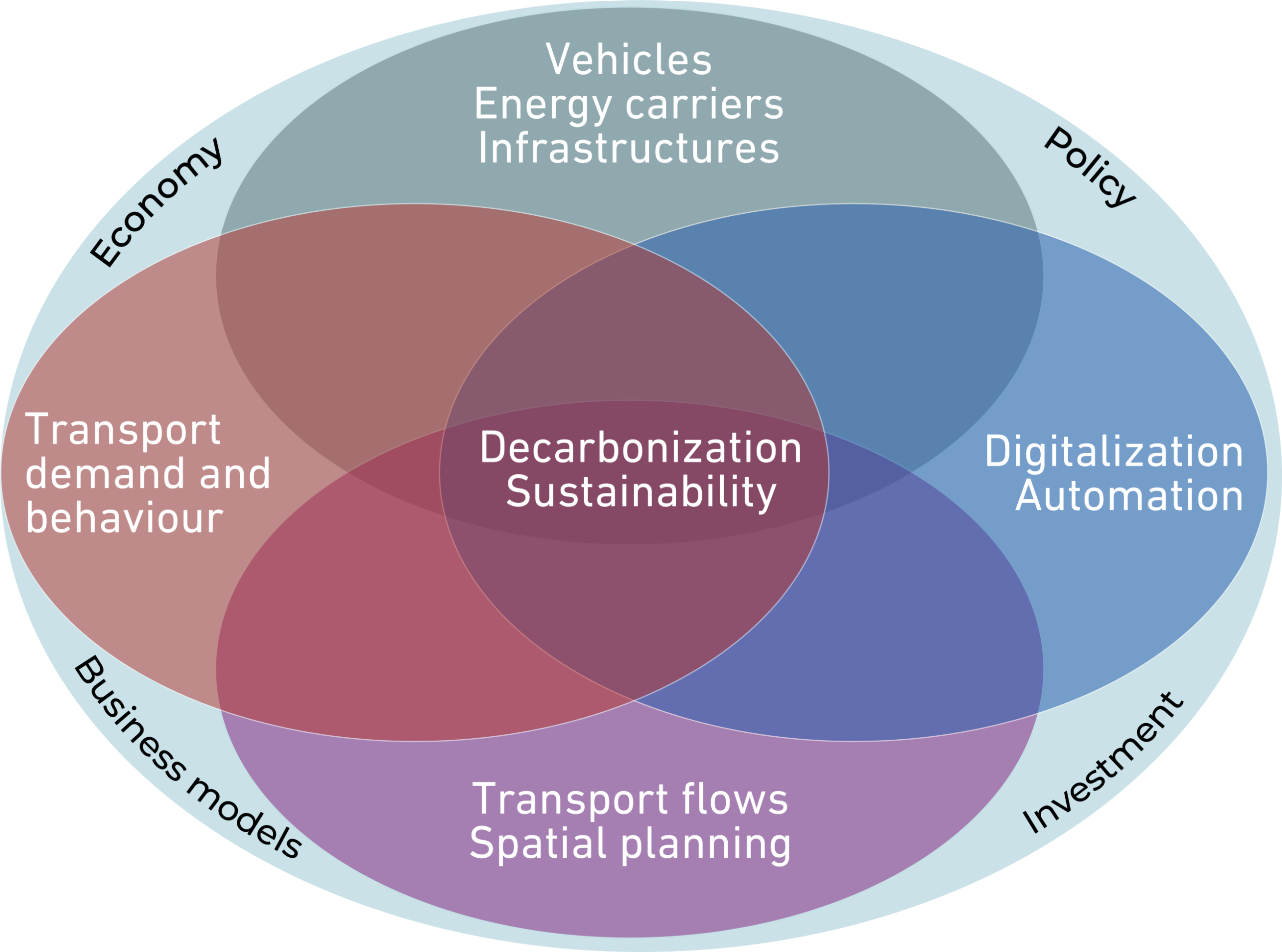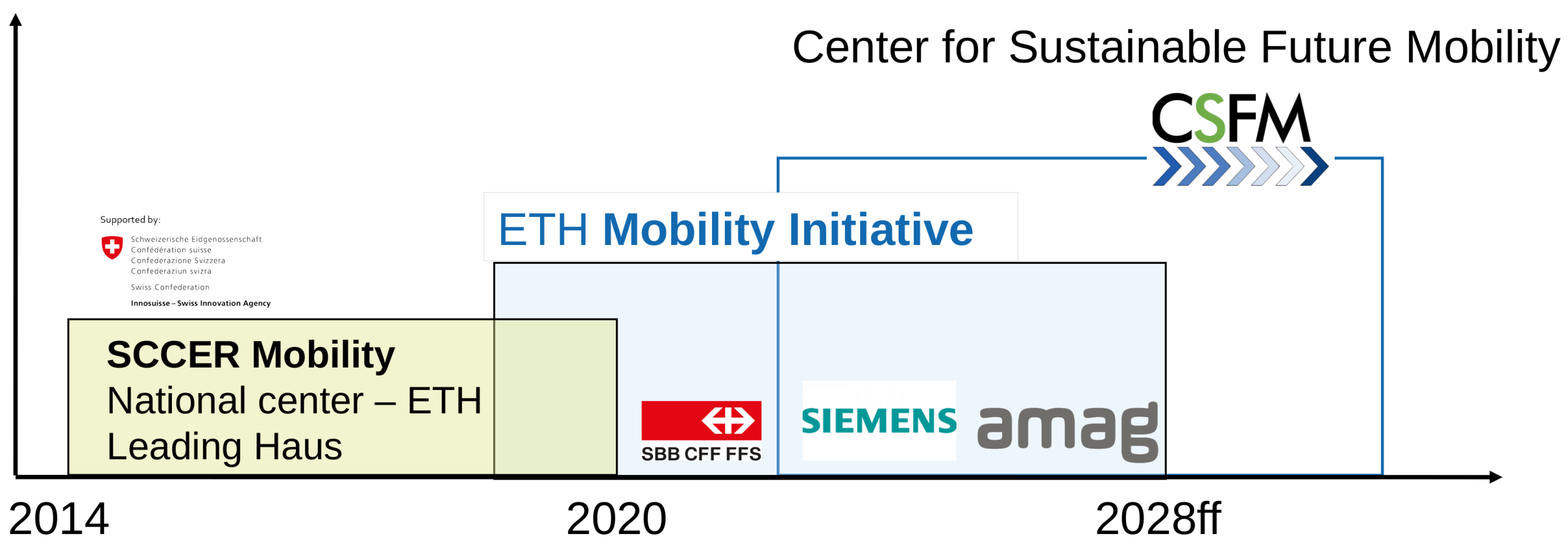Research & Innovation
Coordinated research and innovation on Mobility at ETH Zurich
SCCER Mobility

ETH Zurich hosted the Swiss Competence Center for Energy Research (SCCER Mobility) from 2014 until 2020. The Center on efficient technologies and systems for mobility was funded by Innosuisse and structured research program was addressing critical technologies, systems, and socioeconomic issues relevant to drastically reduce CO2 emission within the transportation sector.
ETH Mobility Initiative
ETH Zurich launched the ETH Mobility Initiative together with the Swiss Federal Railways (SBB) as their first partner in 2018, followed by Siemens joining in 2019 and AMAG in 2020 to further expand research and education in the area of mobility. Within this framework, a long-term research program has been established aiming at bringing together competencies from academic and industrial research in the field. The overarching goal of the ETH Mobility Initiative is to develop solutions that address the grand challenges of business and society in the coming decades. The program is structured around annual calls over a period of ten years that supports research projects at the doctoral and post-doctoral levels. Initially hosted by the SCCER Mobility, the initiative is integrated in the programme of the Center for Sustainable Future Mobility from 2021.
Center for Sustainable Future Mobility

The CSFM s primary mission is to promote research activities that foster the realization of a sustainable transportation system from an environmental, social, and economic perspective. This implies a transportation system completely based on renewable energy sources, economically affordable and socially inclusive.
Research strategy
The center's primary mission is to promote research activities that foster the realization of a sustainable transportation system this implies a transportation system completely based on renewable energy sources. The graphic represents the major research areas the CSFM members address.

Mobility draws its strength from its enabling infrastructure, which pertains to the vehicles, the roads/pavement, aviation, and railway related assets (incl. important role of railway stations), which define the capacity and performance of the network for transportation of people and goods. In this respect, defining technologies that can reshape mobility entail improved powertrain and vehicle technologies, new materials for maximizing capacity while minimizing carbon footprint, and in particular renewable energy sources for decarbonization as well as new or repurposed transport, distribution and charging infrastructure.
Digital technologies will further change the mobility sector with accelerating speed. The ability to mine, process and use vast amounts of data related to transport is already starting to reshape the transport sector, enabling new operational models such as “Mobility as a Service”, or autonomous, interconnected vehicles. Their long shadows are affecting both consumer behaviour and investor decision-making now years in advance of their possible implementations. Design, monitoring, and operation of mobility systems could therefore be optimized, relying on data-driven and automated modules. To allow for these improvements, policy-makers, service providers and technology/infrastructure ought to adapt their modus-operandi towards an integrated and systems-oriented approach.
Flows of people and goods are the result of, but also the enabler of, social and economic change. They can be influenced by policies, in particular by restraints, quotas, pricing and the capacity of infrastructures and of services. Predictive capabilities for the extent of such responses and impacts are therefore very important for the sustainable operation of the systems in the short run and for the investment and maintenance decisions in the long run.
A better knowledge of the factors that influence the demand for transport services of the users of the transport system (individuals, firms, institutions), an understanding of the preferences and attitudes towards new technologies and of the effectiveness of transport policy measures, provide important insights to better design and implement a sustainable transport system. Building on the progress of the other themes the Center will analyse current transport behavior patterns, test new technologies, new transport approaches in suitable transdisciplinary test cases with our stakeholders. Further, the center will analyse which policy measures and involvement processes are more effective to implement these new technologies and transport approaches. The careful analysis of the politics, economics and social network interactions is part of this work.
Reports
- Download Auf dem Weg zu einem energieeffizienten und klimafreundlichen Schweizer Mobilitätssystem
- Download Decarbonisation of transport: Options and challenges
- external page ITF Transport Outlook 2017
- Download SCCER Mobility Mission Report
- Download Towards an Energy Efficient and Climate Compatible Future Swiss Transportation System
- Download Impact report: ETH Mobility Initiative



